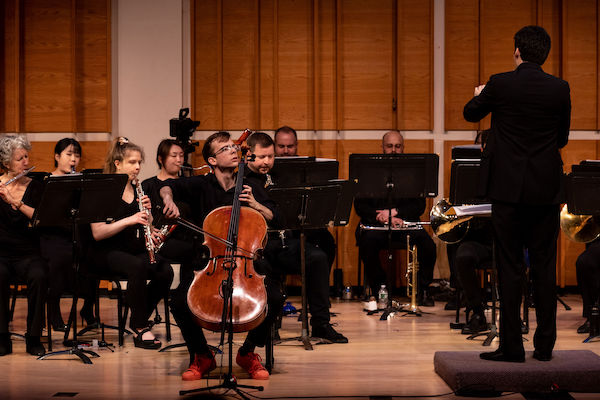Gulda concerto highlights Parlando’s dance-inspired finale

The institutionalization of classical music has been a double-edged sword. One side of the blade has carved a space in which the music of the past is preserved through performing venues, ensembles, and the conservatory training of new musicians and composers. The opposite edge has cut away most connections with the larger world of music and listeners, leaving classical music culture to ponder how to get people to come and experience their preservation efforts.
It doesn’t have to be this way, as Ian Niederhoffer’s Parlando chamber ensemble showed, again, Sunday afternoon at Merkin Hall in their season finale. Parlando belongs in the company with Death of Classical, organizations that make the classical world appealing to a broad audience while also honoring the listener’s intelligence and curiosity.
Parlando does this mainly through Niederhoffer’s programming concepts and his remarks from the stage before each work (the cutesy labeling of each piece in the program with the musical equivalent of the chili pepper symbols seen on Thai restaurant menus is superfluous). Sunday, the program was “Requiem for a Polka,” a thoughtful and entertaining concert of danceable classical music.
Well, not quite danceable. Via Jacques Ibert’s Divertissement, Henryk Górecki’s Kleine Requiem für eine Polka, and the Concerto for Cello and Wind Orchestra, by Friedrich Gulda there were polkas and other dance flavors. But the larger point Niederhoffer made was that European classical music once was closely connected to popular music. This was true from before the idea of classical music even existed, even before the song “L’ homme armée” became the foundation for much Renaissance liturgical music.
Niederhoffer hinted at how the development of audio recording and reproduction technology cemented the idea of genres and indirectly separated the idea of entertainment from classical music. Parlando’s lively performance put on display the sense of basic fun and pleasure in music, regardless of genre, and how musicians held onto it even if classical music culture didn’t.
Entertainment is the purpose of Ibert’s Divertissement—music literally meant to occupy the time between scenes at the theater, and keep the audience attentive and energized. The music has moments of slow sensuality, but mostly dances and leaps with energy and agility, full of jokes and fun. It’s an ideal mix of Debussy’s colors and Stravinsky’s neo-classicism. The only drawback in the playing is that the ensemble feels like it’s outgrown Merkin, with too much strength for the confines of the hall..
Górecki’s Requiem is a fascinating piece, capturing his ambivalent regret about the dissolution of quasi-universal European culture after the collapse of the Soviet Union, and the reemergence of splintered nationalism at the crossroads of Germany, Poland, and the then Czechoslovakia. The vehicle is the polka, abstracted here, a musical lingua franca that cemented countries and also musical styles. This was a concentrated, measured performance, controlled and confident, with the strange obsessive quiet and stillness, alternating with mania, that Górecki picked up from Shostakovich. One was impressed with how Parlando switched with ease between those two feelings, all without sentimentality.
Henry Shapard, principal cellist at the Vancouver Symphony Orchestra, was the guest soloist for Gulda’s wild concerto. Gulda was a singular and incredible musician, arguably the finest Beethoven and Mozart pianist of the 20th century, and also a terrific jazz and rock musician. He saw no separation between the importance of these genres and did what he wanted in music, following nothing other than his personal imperatives.
The concerto juxtaposes a Mozartian wind ensemble—given some impressively stylish music—and a jazz-rock group with brass, built around a guitar, bass, and drums. Until the finale of this five-movement work the two groups alternate, one reaching a cadence that the other picks up in a hilariously apposite, and skillful style. It’s all serious fun, extroverted and charismatic while full of real feeling and love for all music.
Shapard clearly had a hell of a lot of fun playing this, and seemed as serious and entertained about the notes as Gulda was. His sound and rhythmic sharpness carried both the rock and classical styles, and his playing of the middle cadenza was terrific, with a real sense of finding his way spontaneously through the music.
The one minor flaw in the performance had to do with that double-edged sword again—except for percussionist Andrew Beall at the drum kit, the rock group couldn’t play convincing rhythms. But in the end, the point was that for Parlando, it didn’t matter what you called the music, as long as you dug it.